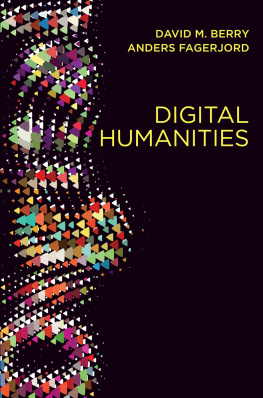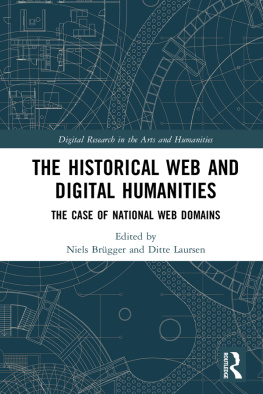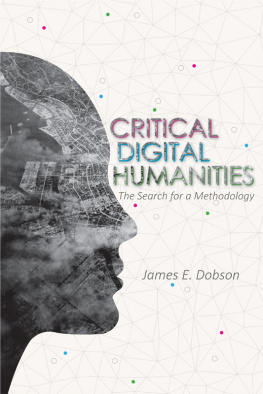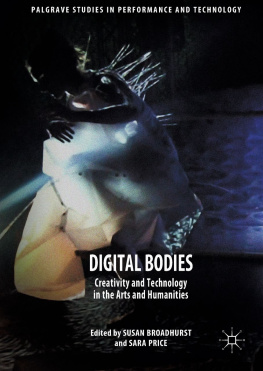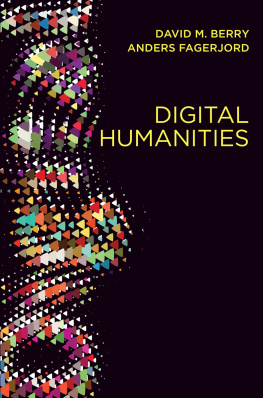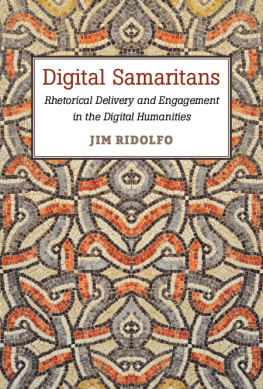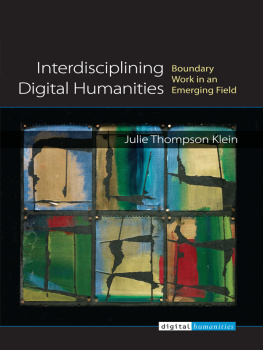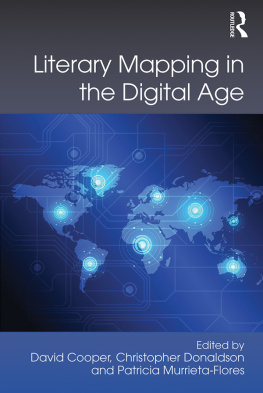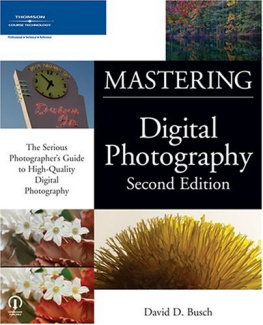David M. Berry - Digital Humanities Knowledge and Critique in a Digital Age
Here you can read online David M. Berry - Digital Humanities Knowledge and Critique in a Digital Age full text of the book (entire story) in english for free. Download pdf and epub, get meaning, cover and reviews about this ebook. year: 2017, publisher: Wiley, genre: Science. Description of the work, (preface) as well as reviews are available. Best literature library LitArk.com created for fans of good reading and offers a wide selection of genres:
Romance novel
Science fiction
Adventure
Detective
Science
History
Home and family
Prose
Art
Politics
Computer
Non-fiction
Religion
Business
Children
Humor
Choose a favorite category and find really read worthwhile books. Enjoy immersion in the world of imagination, feel the emotions of the characters or learn something new for yourself, make an fascinating discovery.
- Book:Digital Humanities Knowledge and Critique in a Digital Age
- Author:
- Publisher:Wiley
- Genre:
- Year:2017
- Rating:4 / 5
- Favourites:Add to favourites
- Your mark:
- 80
- 1
- 2
- 3
- 4
- 5
Digital Humanities Knowledge and Critique in a Digital Age: summary, description and annotation
We offer to read an annotation, description, summary or preface (depends on what the author of the book "Digital Humanities Knowledge and Critique in a Digital Age" wrote himself). If you haven't found the necessary information about the book — write in the comments, we will try to find it.
Digital Humanities Knowledge and Critique in a Digital Age — read online for free the complete book (whole text) full work
Below is the text of the book, divided by pages. System saving the place of the last page read, allows you to conveniently read the book "Digital Humanities Knowledge and Critique in a Digital Age" online for free, without having to search again every time where you left off. Put a bookmark, and you can go to the page where you finished reading at any time.
Font size:
Interval:
Bookmark:

DAVID M. BERRY AND ANDERS FAGERJORD
polity
Copyright David M. Berry and Anders Fagerjord, 2017
The right of David M. Berry and Anders Fagerjord to be identified as Authors of this Work has been asserted in accordance with the UK Copyright, Designs and Patents Act 1988.
First published in 2017 by Polity Press
Polity Press
65 Bridge Street
Cambridge CB2 1UR, UK
Polity Press
350 Main Street
Malden, MA 02148, USA
All rights reserved. Except for the quotation of short passages for the purpose of criticism and review, no part of this publication may be reproduced, stored in a retrieval system or transmitted, in any form or by any means, electronic, mechanical, photocopying, recording or otherwise, without the prior permission of the publisher.
ISBN-13: 978-0-7456-9769-7
A catalogue record for this book is available from the British Library.
Library of Congress Cataloging-in-Publication Data
Names: Berry, David M. (David Michael) author. | Fagerjord, Anders, author.
Title: Digital humanities : knowledge and critique in a digital age / David M. Berry, Anders Fagerjord.
Description: Cambridge, England ; Malden, MA : Polity Press, [2017] | Includes bibliographical references and index.
Identifiers: LCCN 2016048324 (print) | LCCN 2017010938 (ebook) | ISBN 9780745697659 (hardback) | ISBN 9780745697666 (pbk.) | ISBN 9780745697680 (Mobi) | ISBN 9780745697697 (Epub)
Subjects: LCSH: Digital humanities.
Classification: LCC AZ105 .B395 2017 (print) | LCC AZ105 (ebook) | DDC 001.30285--dc23
LC record available at https://lccn.loc.gov/2016048324
The publisher has used its best endeavours to ensure that the URLs for external websites referred to in this book are correct and active at the time of going to press. However, the publisher has no responsibility for the websites and can make no guarantee that a site will remain live or that the content is or will remain appropriate.
Every effort has been made to trace all copyright holders, but if any have been inadvertently overlooked the publisher will be pleased to include any necessary credits in any subsequent reprint or edition.
For further information on Polity, visit our website: politybooks.com
For Lorna M. Hughes and Andrew Prescott
This book would not have been written without the support and assistance of a large number of colleagues who have in various ways contributed to the project. So, first, we would like to individually thank our respective supporters.
David would like to thank Mansfield College, University of Oxford, for electing him a Visiting Fellow during 2015/16, which offered a hugely supportive and scholarly environment in which to complete this book and especially Pam Berry, Tony Lemon and John Ovenden, with whom he enjoyed many Wednesday evening Formals. David would also like to thank colleagues in the School of Media, Film and Music at the University of Sussex and the members of the Sussex Humanities Lab: particularly Caroline Bassett, Tim Hitchcock, Sally Jane Norman, Rachel Thomson and Amelia Wakeford, and, in the Computational Culture strand, Beatrice Fazi, Ben Roberts and Alban Webb. David is also grateful to the University of Sussex for support for the Sussex Humanities Lab and for digital humanities and computational media at Sussex particularly Michael Davies, Debbie Foy-Everett and Alan Lester. He would also like to give thanks for the continued support of colleagues: Christian Ulrik Andersen, Armin Beverungen, Ina Blom, Melanie Bhler, Michael Bull, Mercedes Bunz, Natalia Cecire, Andrew Chitty, Faustin Chongombe, Christian De Cock, Natalie Cowell, Michael Dieter, Kathryn Eccles, Wolfgang Ernst, Leighton Evans, Gordon Finlayson, Paul Flather, Jan Freeman, Matthew Fuller, Steve Fuller, Alex Galloway, Craig Gent, David Golumbia, Ground Coffee House in Lewes (particularly Beth, John and Rick), Andres Guadamuz, David Hendy, Lorna M. Hughes, Tim Jordan, Athina Karatzogianni, Raine Koskimaa, Alan Liu, Paul Lodge, Geert Lovink, Thor Magnusson, The Mansfield College Porters, Chris Marsden, Ursula Martin, Derek McCormack, William Merrin, Peter Nagy, Jussi Parikka, Luciana Parisi, The Pelham Arms, Alison Powell, Andrew Prescott, Ned Rossiter, David De Roure, Lucinda Rumsey, Darrow Schecter, Paul Solman, Bernard Stiegler, Nathaniel Tkacz, Transmediale, Iris van der Tuin, Craig Vear, Pip Willcox and the many, many people he may have forgotten to include. Additionally, David would like to thank his Ph.D. students: Yilmaz Aliskan, Emma Harrison, Isla-Kate Morris and Carina Westling for their continued discussions. Many thanks also have to be expressed to Anders Fagerjord who has been a wonderfully collaborative and thoughtful co-writer. Finally, David would also like to thank his partner, Trine Bjrkmann Berry, and their children, Helene, Henrik Isak and Hedda Emilie, for accepting the disruption to family life from writing yet another book.
Anders would like to thank all his fantastic colleagues at the Department of Media and Communication at the University of Oslo, particularly Terje Colbjrnsen, Charles Ess, Bente Kalsnes, Lucy Kng, Maren Moen, Marius fsti, Terje Rasmussen, Tanja Storsul, Espen Ytreberg, the members of the band Stimulus Response, and Gunnar Liestl, who introduced him to digital humanities more than two decades ago. His Ph.D. students Joakim Karlsen and Kim Johansen stby have also introduced him to new areas and ideas, for which he is truly grateful. The Department of Information Science and Media Studies, University of Bergen, let him share an office space there for several months when this book was being written, and he would like to give thanks for the hospitality and support extended by Rune Arntsen, Kurt Gjerde, Stein Unger Hitland, Leif-Ove Larsen and Terje Thue. While there, he also enjoyed many fruitful discussions, including those with Dag Elgesem, Jostein Gripsrud, Lars Nyre, Eirik Stavelin and Bjrnar Tessem. He would also like to thank his many friends and colleagues for continued support over the years, including Espen Aarseth, Cheryl Ball, Jay Bolter, Taina Bucher, Martin Engebretsen, Gail Hawisher, Steve Jones, Anders Olof Larsson, Anders Sundnes Lvlie, Andrew Morrison, Cuiming Pang, Jill Walker Rettberg and Scott Rettberg. Finally, he would like to thank David Berry, who first came up with the idea for this book and invited him to take part, something he has enjoyed immensely.
We would both like to thank the team at Polity, who have been very supportive throughout the writing process. We would also like to thank Marcus Leis Allion for his wonderful cover design and for agreeing to take on the project. We are grateful to all the colleagues who have supported the writing of this book, and especially those who hack and those who yack in the digital humanities.
Introduction
This book is about the digital humanities, an exciting new field of research that emerged at the beginning of the 2000s. Nonetheless, as a term, it helpfully situates humanities research that is self-consciously digital in its orientation, and assists in giving a sense of the kinds of research practice that are increasingly being shared and incorporated into humanities scholarship.
One need not talk to many humanists, however, before one learns that this label is an umbrella term for a variety of diverse practices, which often have a history that is older than that of the digital computer. Some voices also echo the opinion that digital humanities is somehow alien to the tradition of humanities, and may even be a threat to its values. In this book, we touch on some of these controversies and debates and seek to contribute to understanding of them and the ways in which they offer helpful critique, and, sometimes, anti-technology polemic.
Font size:
Interval:
Bookmark:
Similar books «Digital Humanities Knowledge and Critique in a Digital Age»
Look at similar books to Digital Humanities Knowledge and Critique in a Digital Age. We have selected literature similar in name and meaning in the hope of providing readers with more options to find new, interesting, not yet read works.
Discussion, reviews of the book Digital Humanities Knowledge and Critique in a Digital Age and just readers' own opinions. Leave your comments, write what you think about the work, its meaning or the main characters. Specify what exactly you liked and what you didn't like, and why you think so.

